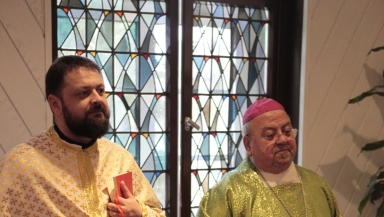
In an impassioned appeal, the Maronite Archbishop of Damascus called on Christians around the world to show solidarity with the Christian faithful in Syria – as the civil war shows no sign of ending.
During a visit to the international headquarters of Catholic charity Aid to the Church in Need in Königstein, Germany, Archbishop Samir Nassar of Damascus described how the ongoing fighting has brought death and devastation to Syria's families.
He said: "There has been war [in Syria] for three years, and it is destroying the whole country."
According to Archbishop Nassar around two million homes have been destroyed in the country "which means that two million families are without a roof over their heads".
"The people feel lost and without support."
He stressed that many Christians want to flee the country because of the ongoing conflict, but are unable to get visas to go abroad as foreign embassies are shut.
Stressing the scales of the deaths in the country, the Maronite prelate said: "[T]hey are dying where they are, in solitude and silence.
"And since all the cemeteries are already full, our only project for 2014 is to build a bigger cemetery."
According to figures from the Syrian Observatory for Human Rights, 110,371 people have died during the conflict. Of these at least 40,146 were civilians including about 4,000 women and more than 5,800 children.
Despite the scale of the deaths, Archbishop Nassar spoke optimistically about the prospects for the future.
He said: "But Christian hope lives on. With the help of ACN we are now preparing for the future, for the rebuilding after the war and for an ecumenical collaboration among the Christian Churches and all the faithful in the orient."
ACN has provided more than €500,000 for projects in the country this year, including emergency aid for displaced families.
The Archbishop of Damascus described how the Maronite Church – an Eastern Church in full communion with the Pope – had sent one seminarian to Lebanon, who would be ordained by 2020 and would return to Syria to help rebuild the Church.
The prelate also stressed the Church's desire to work together with Islam, with both faiths contributing to the future of the country.
Archbishop Nassar said: "For 14 centuries we have lived in its shadow. If we want to continue to live in the future, then it can only be together. That is a great challenge, but we can succeed in it."
The Archbishop also stressed the importance of giving young people "more weight in the Church" and placing more emphasis on the Church's social teaching, which he said was key for their work with non-Christians.
Finally he asked the world's Christians not to forget Syria in their prayers: "I entrust Syria to your prayers. May God bless you."













